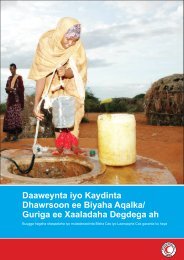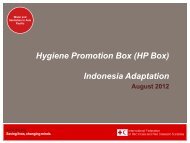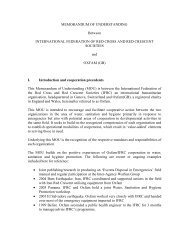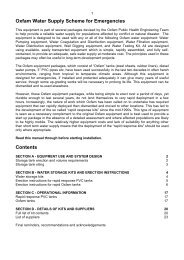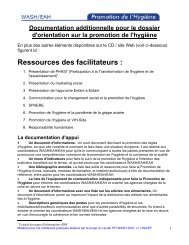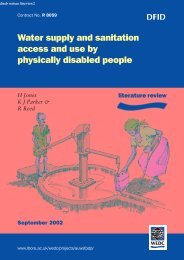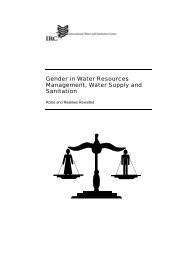Hygiene Promotion - IRC International Water and Sanitation Centre
Hygiene Promotion - IRC International Water and Sanitation Centre
Hygiene Promotion - IRC International Water and Sanitation Centre
You also want an ePaper? Increase the reach of your titles
YUMPU automatically turns print PDFs into web optimized ePapers that Google loves.
Appendix 3. Definitions"Health education is the process of interaction between people in order to discuss theirhealth situation, with the aim to create awareness about health status <strong>and</strong> to decide jointlyhow this situation can be improved” (Timmermans <strong>and</strong> de Walle, 1995: 278)“<strong>Hygiene</strong> education is ..all activities aimed at encouraging behaviour which will help toprevent water <strong>and</strong> sanitation- related diseases” (Boot <strong>and</strong> Cairncross, 1993: 33)“<strong>Hygiene</strong> promotion is the planned approach to preventing diarrhoeal <strong>and</strong> other water <strong>and</strong>sanitation related diseases through the widespread adoption of safe hygiene practices”(Adjusted from Curtis <strong>and</strong> Kanki, 1998: 10)These are some of the more recent definitions on the promotion of better health <strong>and</strong>hygiene. In these definitions, health refers to what the World Health Organizes defines as‘a state of complete physical, mental, <strong>and</strong> social well-being <strong>and</strong> not merely the absence ofdisease, or infirmity’.(online available http://www.who.int/hpr/ageing/Men Ageing <strong>and</strong>Health.doc). <strong>Hygiene</strong> comes from the Greek hygieinos, which translates literally as‘healthful’. The term has, however, come to mean “the practice of keeping oneself <strong>and</strong>one’s surroundings clean, especially to prevent illness or the spread of diseases” (Boot<strong>and</strong> Cairncross, 1993: 6).While health education <strong>and</strong> promotion thus st<strong>and</strong> for the encouragement, in many differentways, of a better overall well-being, hygiene education <strong>and</strong> promotion relate especially toreduction of infectious diseases spread through unhygienic conditions <strong>and</strong> practices.Infectious diseases are the world’s leading cause of death.http://www.un.org/Pubs/CyberSchoolBus/special/health/index.htmlIn 1997, at least 17.3 million, ore one third of 52.2 million women, children <strong>and</strong> men diedfrom these diseases. Among them, diseases related to poor hygiene, sanitation <strong>and</strong> watersupply, are highly prevalent, especially diarrhoeas. Table 1 gives information on how muchthese incidences can be reduced by improving sanitation, hygiene, <strong>and</strong> the use of more<strong>and</strong> safer water.In the above definitions, the terms hygiene “education” <strong>and</strong> “promotion” are both used foractivities <strong>and</strong> programmes that encourage better hygiene. In this paper, we givepreference to the term hygiene promotion because hygiene education is often still used inits narrow meaning of spreading information <strong>and</strong> giving instructions. On their own, theseactivities are seldom suitable to bring about lastingly improved conditions <strong>and</strong> practices.76 <strong>Hygiene</strong> promotion



